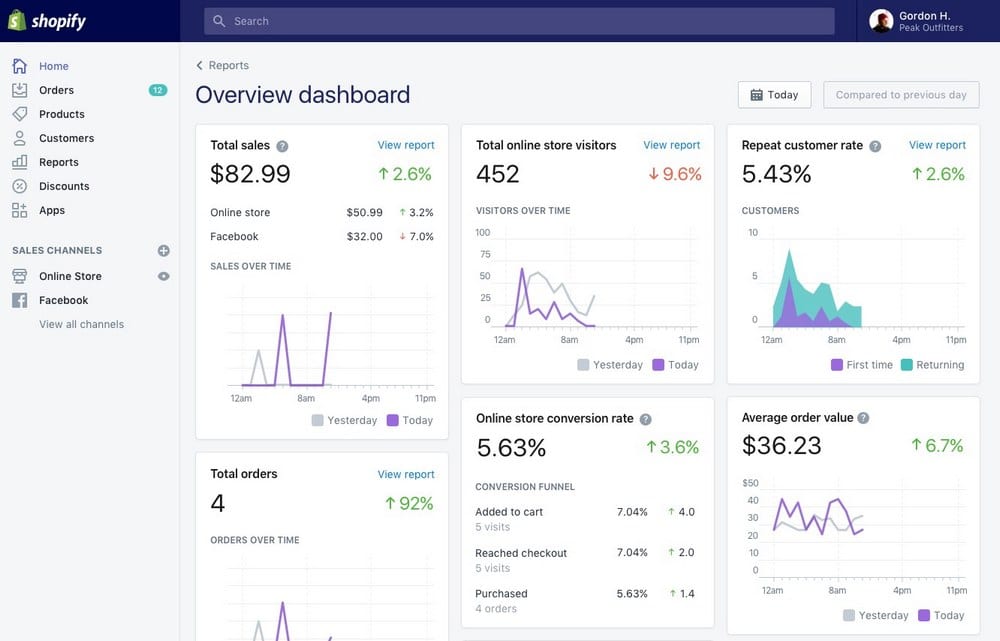Why Should You Integrate Ecommerce Platforms And POS Systems?
In 2023, global eCommerce revenues are estimated to reach a total of $5.8 trillion. The eCommerce sector is undoubtedly growing and will continue to prosper well in the future. Therefore, Point-of-sale (POS) systems have consequently transformed into an essential component of the retail industry.
In retail business especially for B2C, these platforms are required to generate sales and enhance shopping experiences. However, if eCommerce and POS are not integrated, businesses may encounter many risks in inventory and operation. As a result, ecommerce POS integration plays a vital role in supporting businesses in streamlined operations and consistent customer satisfaction in real time.
In this article, we will provide you with the importance of integrating a POS system with eCommerce platforms and how to proceed.
Challenges of a Lack of POS eCommerce Integration
Since 1991, traditional stores are no longer the only channel for businesses to sell products due to the flourishing of eCommerce. Retailers now operate online and offline, striving to expand their revenue streams and cater to a broader customer base.
To efficiently manage the influx of transactions and orders, a modern retail management system has become indispensable. This system ensures seamless data handling, preventing any disruptions in day-to-day operations. Furthermore, customers today seek convenience, desiring the ability to effortlessly switch between online and offline shopping channels. This not only saves valuable time but also enables them to make informed choices by accessing products from reputable retailers. The retail industry is witnessing a transformation driven by the pursuit of customer satisfaction and operational excellence.
Without ecommerce POS integration, businesses may face several challenges in the selling process to customers, including
Manual Processes and Data Entry Errors
When data synchronization is lacking, businesses often face challenges in managing customer orders due to delays in updating information. This can lead to data inconsistencies and inaccurate business reporting. As a result, they can be challenged to make decisions and easily meet risks.
Avoid Overstock and Out-of-stock Situations
Besides, without real-time inventory tracking and management from POS ecommerce integration, businesses may encounter excess inventory or out-of-stock situations. They can lead to several risks such as unnecessary costs, missed sales opportunities and decreased customer satisfaction.
Fail to Meet Customer Expectations
Without ecommerce POS integration, retail systems may have difficulty providing tailored suggestions for customers, resulting in missing sales opportunities. Besides, it easily fails to meet customer expectations across many sales touchpoints, which leads to customer dissatisfaction and decreases retention rates. Poor shopping experience not only destroys existing customer relationships. It also puts businesses at risk for prospects.
4 Benefits of Integrating eCommerce Platforms and POS Systems
On the other hand, the integration of eCommerce platforms and point-of-sale systems brings benefits to both customers and business owners.
Streamlined Inventory Management
Integration of a Point of Sale (POS) system with an ecommerce platform offers streamlined inventory management to businesses. Particularly, the ecommerce POS integration offers businesses several advantages in managing inventory, including:
- Automatic updating of inventory in real-time
- Managing stock levels and product availability
- Precise demand forecasting and inventory planning
- Effective management of stocks and alignment with customer demand
- Improved cost-efficiency through optimized inventory levels
Enhance Customer Experience
An eCommerce POS system offers an array of invaluable benefits, including personalized recommendations and seamless order history synchronization. By linking these systems, businesses can leverage the power of data analytics to provide customers with tailored product recommendations based on their purchase history and preferences. This personalization not only enhances the shopping experience but also increases the likelihood of successful cross-selling and upselling. Integrating an ecommerce platform with the POS system enables businesses to streamline payment processing and ensure efficient retail operations.
As a result, customers can take some advantages from the integration, including:
- View purchase history, track orders, and access receipts easily
- Receive assistance quickly from CRM systems during the purchase process based on real-life customer history data via integration, which will raise customer satisfaction.
- Obtain a personalized shopping list from an ecommerce store, which reduces time in searching for information and making decisions.
- Purchase and redeem gift cards in both offline and online stores.
As a sample for leveraging customer experience, Printify, a Print-on-Demand & shipping platform, integrates with various eCommerce platforms, including Shopify, Etsy, WooCommerce, SquareSpace and others. Thanks to the integration, Printify can automatically sync orders, and inventory updates for the business. For instance, Afro Unicorn is a business that sells unicorn items through various eCommerce and retail supply chains. By integrating with Printify, Walmart, and Amazon, the business is able to offer customers a wide range of purchasing options. The integration of offline POS with Amazon and Printify also helps the brand easily manage inventory and orders. Additionally, customers have the convenience of being able to redeem gift cards both in offline and online stores.
For customers, it processes payments and sends shipping notifications to customers, leading to a better ecommerce platform experience.
Improved Business Efficiency
Integration of a Point of Sale (POS) system with an ecommerce platform brings significant automation, streamlining processes and drastically reducing manual errors while saving valuable time. When these systems are integrated, businesses can get several advantages to enhance operational efficiency and business intelligence capabilities, including:
- Eliminating the need for manual data entry or reconciliations and mitigating the risk of human errors.
- Simplifying operation process, from updating product availability to processing orders and customer credit card processing.
- Utilize customer data over time to generate sales immediately.
- Speed up the customer purchase order cycle.
Real-Time Analytics and Reporting
Integrating a Point of Sale (POS) system and an eCommerce platform facilitates real-time analytics and reporting across all business channels. Therefore, businesses can aggregate and centralize data from both in-store and online transactions, allowing for a unified view of their sales & inventory performance, and customer preferences across various touchpoints.
Businesses can utilize real-time analytics and reporting in several ways, including:
- Make informed and strategic decisions based on reliable sales data analysis
- Tailor ecommerce marketing and product offerings based on customer insights
- Enhance overall customer experience through data-driven insights
- Leverage data for agility and timely decisions
For instance, Magestore POS integrates with leading eCommerce platforms like Magento. It provides businesses with real-time sales data, inventory levels, and customer data insights, enabling them to make data-driven decisions using an ecommerce platform.
How To Integrate a POS System with an eCommerce Platform?
eCommerce POS integration can seem daunting, but it doesn’t have to be. There are three methods that businesses can use to integrate separate systems, including using an API, middleware integration, or custom software.
API Integration
APIs (Application Programming Interfaces) facilitate communication between different software applications. They enable real-time data synchronization between POS and eCommerce platforms, ensuring accurate and up-to-date information across all channels.
API integration simplifies the integration process and eliminates the need for manual data entry, reducing errors and enhancing efficiency. However, it requires technical expertise to implement and may not support all features of an ecommerce platform.
Middleware Integration
Middleware acts as a bridge between eCommerce platforms and POS systems. It synchronizes data by translating information into a format that both systems can understand. Middleware integration is flexible and supports complex integrations with multiple systems.
Using middleware reduces the time and resources required for integration. However, it may add a layer of complexity to the infrastructure and may require ongoing maintenance.
Custom Integration
Custom development offers tailored solutions for businesses that require unique integration requirements. It enables businesses to optimize their processes and add custom features, such as an ecommerce platform, that are specific to their business needs.
Custom integration requires significant technical expertise and resources. It may also take longer to develop and implement compared to off-the-shelf solutions.
Top 4 POS Systems for Integrating with eCommerce Platforms
1. Magestore – Best POS for Magento & Shopify
Magestore POS is the leading POS system designed for Magento and Shopify merchants who want to scale up their businesses at any time. It provides businesses with real-time synchronization between their online and offline stores, enabling them to manage their inventory efficiently and improve customer experience.
Here are some advantages:
-
Pay one time, no hidden costs
- Sync inventory, purchase, order, and customer data in real-time
- Seamlessly integrate with eCommerce platforms and other software/apps: payment gateways, accounting systems, shipping platforms, ERP, and CRM
- User-friendly interface
- Access with any device
- Customizable and scalable to fit business needs and size
- Offer offline mode
- Other features included: click and collect, multiple currency, self-checkout system
- Get real-time reports for better performance insights
2. Lightspeed – Recommended for Hospitality, and Golf Businesses
Lightspeed POS is a leading point of sale (POS) and commerce platform designed for retail, hospitality, and golf businesses to enhance their operations and customer experience. It offers a fast, intuitive POS system that integrates with payments, inventory management, sales reporting, shipping, customer data, marketing tools, and ecommerce platforms all in one place.
- Start at $69/month with basic features: inventory management, purchase order management, and data reports.
- Offer a 14-day free trial plan instead of a free plan.
- Flexible and scalable for business.
- Comprehensive reports system providing more than 20 in-depth sales analyses.
3. Vend POS – Recommended for Traditional Retailers
Vend POS integrates with leading eCommerce platforms like Shopify and WooCommerce. It provides businesses with real-time sales data, inventory levels, and customer information, enabling them to make data-driven decisions on their ecommerce platform.
- Price from $99/month
- Integrate with Shopify, WooCommerce, and BigCommerce platforms
- Manage inventory online with reordering and tracking
- Customer service tools: marketing, invoicing, and loyalty programmes
- Integrated payments for faster checkouts and fewer errors
- Protect against threats with endpoint management and PCI/GDPR compliance
4. Shopify POS – Best for Small Businesses
Shopify POS is a powerful POS software provider solution that integrates with Shopify’s ecommerce platform. It provides businesses with a full range of features, including inventory management, order processing, and customer data tracking.
- Provide a free lite version. Prices start at $9/month and $79/month with limited features. The higher plan starts at $105 per month
- Manage online and off-line transactions from one dashboard
- Accept credit cards, debit cards, mobile payments and cash
- Integrate with social media & ecommerce platforms such as Amazon, Esty, and WooCommerce.
Conclusion
POS eCommerce integration is crucial for businesses to stay competitive and meet evolving customer expectations. If you decide to sell online on an eCommerce platform while operating your physical stores, integrating your POS with eCommerce is extremely important to ensure a smooth data sync and centralisation without mistakes.
With streamlined inventory management, enhanced customer experience, improved business efficiency, and real-time analytics and reporting, businesses can optimize their operations and make data-driven decisions.





Leave a Reply